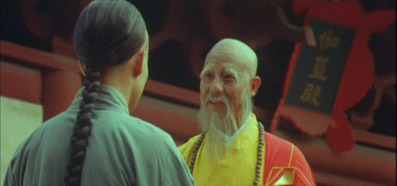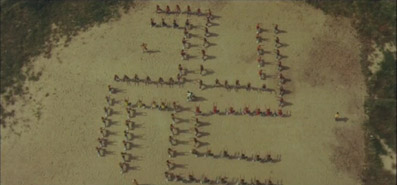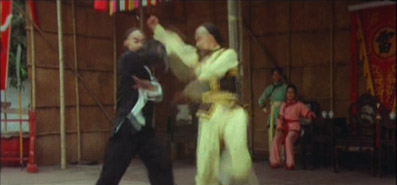|
It's
one of the constants of martial arts cinema that Shaolin
masters have mental and physical abilities beyond those
of normal mortals, skills that they can use right up until
the moment they are murdered by some shiftless bad guy.
In kung-fu films, Shaolin masters never die of old age
and are never beaten in a fair fight. They can be a hundred
years old and still do headsprings and somersaults and kill
you with their little finger. They are the genre's most
revered figures, and to attack one is to openly declare your
status as unredeemably evil.
Such
is the case in The Young Hero of Shaolin,
where an ageing Sifu demonstrates his strength to an awed
young audience by balancing on just two fingers of one hand.
It's a skill, he informs them, learned from a former student
named Fung Hsuin-Yu. At least this is what the English subtitles
call him. Those who know their martial arts folklore will
recognise him as Fong Sai-Yuk. One of the genre's most enduring
figures, Sai-Yuk was a cheerful young martial arts student
whose light-hearted approach to life was balanced his awesome
fighting skills. The character has appeared in a number
of genre films over the years, notably the two 1993
features bearing his name and starring Jet Li, which were released
in the West as The Legend and The
Legend II.

Here
he's played by Shi Bao Hua, a performer whose work I was
unfamiliar with and about whom my research has revealed precious
little. He's a likeable enough screen presence and can
certainly fight, but like so many other martial arts hopefuls
he probably never found quite the right project to move
him into the genre forefront. There are certainly moments
in Young Hero of Shaolin in which his skills
are effectively showcased, but as a whole the film lacks
that special something needed to make it and its
star stand out from a rather busy crowd.
Anyway, following
the Sifu's finger demo we nip back in time to Sai-yuk's
infanthood, where a passing priest and his son Ray (a likely
story) attempt to extort money from Sai-yuk's father and martial
arts-trained mother, who with the help of her Shaolin nun
teacher gives them both a seeing-to. As they depart they make
a promise that they will return to kill Sai-yuk. The teacher
instructs Sai-yuk's mother on how to protect her son and
toughen his body so that he can take even the hardest blow.
Several years later he gets the chance to test it when the
priest returns and punches him through a wall. Mum's teacher
thinks it would be a good idea to send Sai-yuk to a Shaolin
temple to perfect his martial arts.
It's
here that the film fumbles several opportunities to shine.
Sai-Yuk's youthful and wide-eyed clowning on his arrival at
the temple falls a long way short of on-form Jackie Chan,
while a series of extended Wushu demonstrations are covered
in unbroken wide shots like a documentary record of the
Peking Opera in rehearsal, taking little advantage of cinema's
unique ability to involve us in the action.
Things
pick up considerably during a visually striking scene in
which Sai-Yuk and his friend Wai-Kin are tested by a small
army of his fellow students, whose shifting formation work
(which includes a swastika, an old Chinese good luck symbol)
is observed from dizzyingly high-up in the manner of a Busby
Berkley dance number. This is all preparation for Sai-yuk's
journey to Hang Chow, where he's going to fight in a tournament
run by, well, can you guess? Yes it's the nasty, black-bearded
Ray, whose fighting skills have been perfected to the level
where he can take on all-comers and leave them dying in
the dirt. If he can't, then his equally nasty wife will
throw a poisoned dart in their back.

Inevitably
Sai-Yuk and Ray go head-to-head, and in terms of the martial
arts these are the film's strongest sequences, fast and
furious displays of acrobatic, old school kung-fu. Dramatically
predictable and with little really at stake but Sai-yuk's
sense of honour and fair play, they are nonetheless exhilarating
to watch.
The
Young Hero of Shaolin is an amiable but largely
unexceptional genre work that takes a while to deliver on
the action and is seriously plot-light, even for a martial
arts movie. But it should still be of interest to
the genre faithful, for its vigorous final fights, for the
novelty and spectacle of the formation work, for a pole-balancing
battle that prefigures a famous sequence in Iron
Monkey, and – my personal favourite– the monks
who casually shape bricks for building work with a sharp
flick of their fingers or by breaking them on their head.
Framed
2.20:1 and lacking anamorphic enhancement, the print and
transfer are both some way short of sparkling, the slight
picture softness exaggerated on widescreen TVs by having
to zoom in (which itself will be a problem if you don't
have a subtitle mode and you want to watch the film in it's
original dub) and while the contrast is reasonable enough
on brighter exteriors, it all but collapses when things get
dark. Black levels are never quite there and many of the
edit splices are visible at the top of the picture area.
On the up side the print is very clean, save for a few dust
blasts and the odd scratch here and there, and the colour
reproduction a lot better than initial impressions might
suggest.
Both
the original Cantonese and the American English dub are
on offer, but neither is in great shape, the unsurprisingly
narrow dynamic range on the Cantonese track backed by an
oscillating hum that is also clearly audible in the later
stages of the English dub. The English track is slightly
louder and clearer than the Cantonese, but still has a slight
hiss.

The
English subtitles are clear and detailed enough, though
as mentioned above are positioned low enough to be partially
cut off if the picture is zoomed in and not vertically adjusted
on widescreen TVs. Grammatically they leave something to
be desired, with apostrophes intermittently missing or misused,
and the occasional wrong word selected as a result ("your"
instead of "you're" as an abbreviation for "you
are").
Stills
Gallery (1:42)
A rolling gallery of DVD covers and associated artwork for
the film.
Original
Theatrical Trailer (4:20)
A long and detailed Chinese trailer that makes the film
look positively action packed.
Original Theatrical Trailer (English) (3:45)
Doubtless a rarity hauled from what looks like second or
third generation VHS, with drained colour and fuzzy detail.
It's also anamorphically squeezed, but widescreen TV owners
should be able to stretch it out.
English
Credit Sequence
The opening (2:28) and closing
(0:53) sequences of the original English language print.
The opening provides a bit of background on our hero and
a further spelling of his name, which here is Fong Sze Yu.
As with the English trailer both are anamorphically squeezed
and in iffy condition, but will be of interest to enthusiasts.
Shaolin Dahong Quan Demo (34:18 total)
If you've always fancied a Shaolin workout then this is
the extra for you, providing step-by-step guidance in some
of the martial arts exercises used by the monks in their
training, divided into seven segments with a complete demonstration
of the combined steps. The video quality isn't great but
is clear enough, while the original voice-over has been
replaced by a piercingly over-recorded translation of the
master's instructions.
You'll
also find a whole slew of trailers
for Soulblade and Dragon DVDs.
A
technically ragged disc, with the non-anamorphic picture
and humming soundtracks complimented by non-grammar checked
subtitles and mic-in-the-mouth narration on the main
extra feature. Definitely one for the hardcore fans rather
than the casual martial arts viewers, as they are likely
to be far more tolerant of the picture and sound shortcomings,
having spent years trading in second-generation and often
dubbed VHS copies of the rarer works. It is they who will
see past the technical issues to the hardcore enthusiast
motivation that pulled the disc together in the first place.
Word is that the sequel, Young Hero of Shaolin II,
is actually the superior film. Handily, it's just been announced
for a UK DVD release by Soulblade.
|